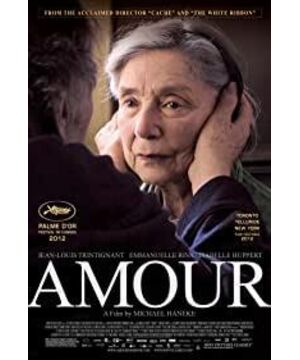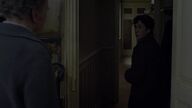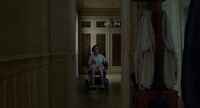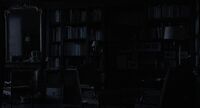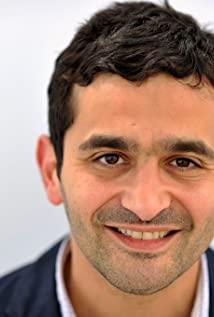Haneke said he returned to classic Greek drama when he was writing the script (here to mention Aristotle’s earliest "triune of drama": the same time, place, and performance), and then he said this paragraph Words: When you are old and elderly, your life is reduced to the four walls you live in.I could have opened up the story and included scenes in the hospital and so forth to make the kind of socially critical film you often see on the television.But that wasn't my concern. I wanted to focus on the love story. I once watched some monologues by Jean-Louis Trintignant, which is unforgettable, and the stage setting of this interior scene dramatizes the movie to a certain extent. It can be regarded as using actors like Jean-Louis to the extreme (Haneck admits that the character Georges was written for him). The ingenious place lies in the "four walls" in that passage. It is not just the meaning of the words. In the movie, these four walls constitute the stage and the "coffin". A few words like this appear repeatedly in the film: Qu'est ce qui se passe(ici)? (what's happening(here)?) Qu'est-ce qu'il ya? (what's wrong?) (French translation of these two sentences Literal translation in English is not in place, because different contexts will show different meanings: completed or incomplete. But it is even more inaccurate in Chinese, because there is no relatively vague intermediate area between our completion and incompleteness. This is The limit of Chinese. So I will probably translate the meaning of the sentence in English).
I said some personal understanding. Anne was afraid of going to the hospital, Georges promised to stay at home to deal with all this until the end of her life. Two shots: 1. The fire brigade broke in and found that the room door could not be opened (in fact, it was sealed with yellow tape). 2. After suffocating Anne, Georges explained the origin of the tape with his own behavior. The question is, why? I think that most people pay attention to the process of death, that is, a mixture of love and hate, the hesitation of life and death, and thus come to the conclusion that they are moved: everything is in the name of "love". This is not a problem, but what about after death? In the film "Love", "life" is a double torture to those who are about to end their life and those who are living. In contrast, "death" is much more dignified, at least in terms of form. So, since she promised Anne not to send her to the hospital, she would not move her out of the apartment after her death. Anne’s inexplicable attachment became the reason that Georges sealed the door and actually made a coffin for Anne. The motive; the seals, the purchased flowers, the doves, the letters, and the lost Georges all give a sense of formality to this non-existent funeral, as well as dignity and love to the dead. The title of the film is "Love". I don't deny that the reason for Georges' promise is "love". It is also "love" that sustains the development of the story. But in the end Georges suffocated Anne. Isn't it "love"? You can say yes, and I can say no. This is what the title I wrote means: This is a way of thinking, not a result. You and I can have two different answers, and neither is right or wrong.
Maybe I am not clear enough, so let me give two more examples. 1. The daughter (Hupper) and son-in-law visited the old couple and complained quite a bit about Georges' treatment of his wife's condition, so Georges said, "You two shut me up... Can we talk about something else?" Then Yu Pell turned around and said, "What are you talking about?" (meaning there is nothing to talk about), at this time Haneke cut the picture and switched directly. 2. The daughter (Hupper) wanted to enter the room to see her mother being blocked. After her persistent visit, she told Georges seriously "You can't go on like this, Dad", and Georges responded "Can't?" "No" "What do you have?" Proposal?" "Don't you want us to talk about this issue seriously?" Then a series of questions from the father, "Do you want to take your mother to live in your own home? Or do you want to send her to a nursing home?" etc. Wait. What these two scenes have in common is that after this series of rhetorical and questioning questions, the reaction of the subject being questioned has not been photographed. Maybe Haneke took it, but cut it off. This makes us naturally think of an answer that the director "may" set in advance, that is, there is a problem with the communication between the two people and there is a lack of emotional trust. But why don’t such questions and distrust lead to the most likely dramatic conflict? Such as excuses, quarrels? The person who may be questioned is speechless (father and daughter in the two scenarios), but this possibility is unlikely. So my judgment is that Haneke deliberately did not write this paragraph, or that he decided to cut the answer after the filming. So the film took on what it is today, that is, when I premiered the film in the theater a few days ago, I saw the reaction in these two places: my daughter didn't understand all of this. Perhaps this is not the case, and the question I still don't understand is why the hand appeared in Georges' dreams, and in turn, the sick Anne was comforting him "quiet down, it's okay"? If the answer is opposite, (that is, the daughter is "right", not that she does not understand) it is my assumption that the "cut out" part shows some puzzling words and behaviors of Georges, then the whole story may be more than just It's as simple as how Anne went to death in her apartment and Georges' company.
Haneke's purpose in cutting out this paragraph (assuming it once existed) is to avoid telling you a result directly. In an interview, he made an interesting point: how should I treat my audience? In other words, how do I treat my audience "seriously"? Do I impose my opinion on the audience, or do I give him a way to form his own opinion? Example: Alan Raynay, "Night and Fog." The film is asking the audience what they think, where they are, and what this means to them. According to his theory, or the "foundation basis" of his creation, what he did before (the two scenes mentioned in the previous paragraph) is inappropriate. In other words, he directly concealed half of the information that may give you a complete idea. At that time, he may think that this has already given you a way to think, and you will establish your own views. It is just to arouse your contemplation. Block out the other half of the original information. But as far as my first impression of watching movies is concerned, this is not the case: I thought I understood what he was trying to explain, but he didn’t actually say that; and he thought it gave me space for me to build my own ideas, but the effect was actually the opposite. : I thought he gave the answer directly. In my opinion, these two scenes do not allow people to diverge and establish opinions, but on the contrary: they deliberately avoid the conflict of drama that should exist, and behind this avoidance is the director's creative concept. I think this is a very important thing, it determines what kind of story the director will tell, and how to tell this story.
For the rest, I have nothing to say about this movie. What can be interpreted and over-interpreted, I have already said. When I tortured myself with such images repeatedly, I even found the limits of some words and audiovisual language. And these limits, I have a feeling of pain and excitement: pain for images, excitement for discovery. Movies have a magical power, and behind this magical power are huge secrets. Only by finding these secrets can you create a good movie.
In the end, I think it is a good movie, but from a vertical point of view, whether it is worthy of Palme d’Or is debatable.
View more about Amour reviews


